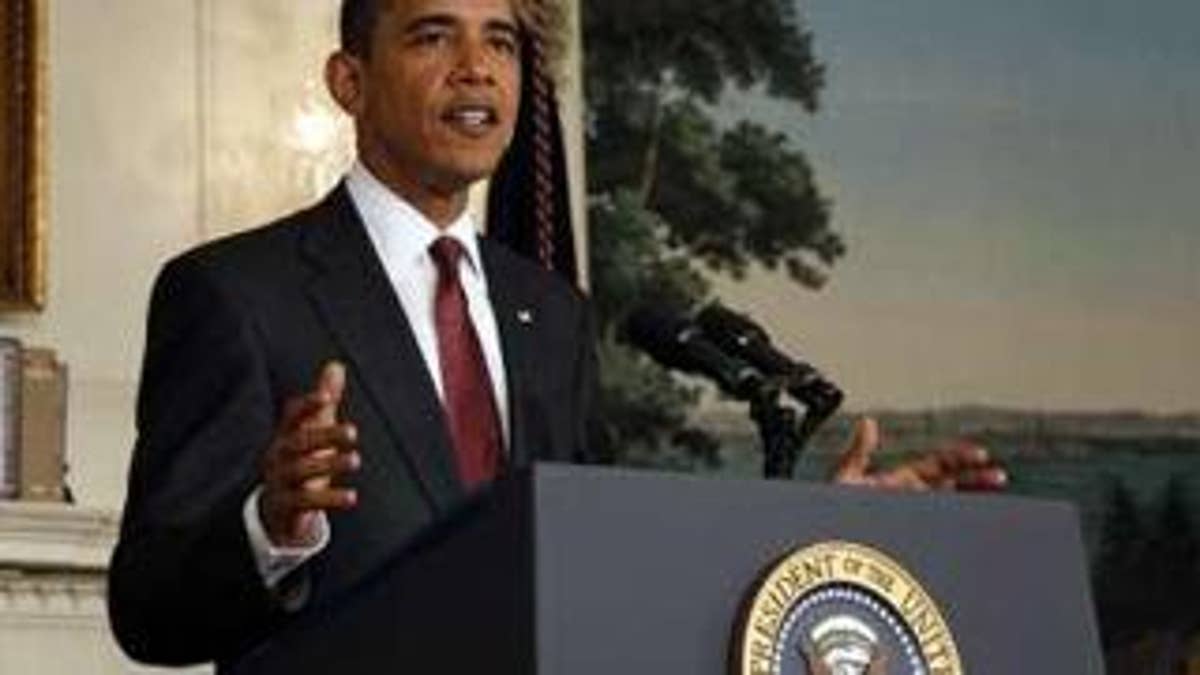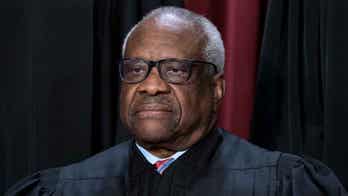
President Obama on Monday rejected a claim that stopping health care reform could mark his "Waterloo," accusing his critics of peddling the "politics of delay and defeat" in an effort to preserve the status quo.
Obama's statements were the latest in a health care reform blitz undertaken by the administration, as it presses lawmakers to produce a palatable overhaul before the perceived window of opportunity passes. Recent poll numbers show the American public is losing confidence in the administration's health care efforts as lawmakers in both parties raise concerns about the eye-popping costs of the plans on the table, and Obama is trying to keep the narrative from spinning out of control.
Without mentioning the senator by name, the president on Monday recounted South Carolina Republican Sen. Jim DeMint's recent comment that derailing his health care overhaul would be like Napoleon's most famous defeat. Obama used the quote to suggest that politics are trumping the interests of the American people.
"Think about that," Obama said. "This isn't about me. This isn't about politics. This is about a health care system that is breaking America's families. ... We can't afford the politics of delay and defeat when it comes to health care -- not this time, not now."
The president urged his critics to move beyond the "politics of the moment" and the "tendency toward inertia" in Washington, and come together to pass a bill.
"The need for reform is urgent and it is indisputable," Obama said.
The window of opportunity, according to Obama, is in the next few weeks. He wants the House and Senate to pass out versions of the bill before the August recess, though he says he's willing to wait until fall for lawmakers to reconcile the differences and for him to sign it.
Time appears to be on the Republicans' side, however, as they insist on a longer consideration so that news of the bills trickles out.
DeMint, in a written statement responding to Obama Monday, said nobody's advocating inaction but that the legislation does not match the rhetoric.
"Americans aren't being fooled and are discovering the truth about his plan which includes rationed care, trillions in new costs, high taxes and penalties that will destroy jobs, and even government-funded abortions," he said.
Public support for the Democratic health plans continues to decline. A Washington Post-ABC News survey released Monday shows approval of Obama's handling of health care reform slipping below 50 percent for the first time. The poll had a margin of sampling error of plus or minus 3 percentage points.
Moreso than the $787 billion economic stimulus package, the president is casting the trillion dollar-plus health care reform as his signature item. Since returning from his latest overseas trip, he has held a series of health care meetings and has with his key advisers made near-daily public statements on the need for reform.
Obama attended a roundtable with health care providers Monday afternoon before delivering his statement. He's planning the fifth press conference of his presidency for Wednesday evening.
Paying for the health care plan remains the major challenge, underscored by a nonpartisan Congressional Budget Office report that emerging House legislation would increase deficits by $239 billion over a decade.
"I don't follow why we've got to spend another $1.5 trillion to $2 trillion, most people estimate, on top of the $2.5 trillion we're already spending in this country and yet still have, under one estimate, at least 33 million people without health insurance," said Sen. Orrin Hatch, R-Utah. "I mean, these are things that are real serious problems."
Democrats insist the budget analysis ignores savings and Obama's pledge not to add red ink to the federal ledger.
"It's clear that they're working with different assumptions than the White House and the Congress is," said Rep. Charlie Rangel, D-N.Y., the chairman of the House tax-writing committee.
On Sunday, the administration's top budget and health officials tried to mollify critics on the morning news talk shows.
White House budget director Peter Orszag told "FOX News Sunday" that despite skepticism the ultimate health care plan will be "deficit neutral."
"There are additional steps that are necessary to make it even better than that over the long term," he said, downplaying the assessment of the director of the Congressional Budget Office last week that the proposals on the table would increase federal health spending.
He seemed to show a little flexibility on the timetable that Obama has appeared to make firm in public, saying it is the "goal" for the House and Senate to pass bills by the recess.
"I think the chances are high," he said.
Health and Human Services Secretary Kathleen Sebelius told NBC's "Meet the Press" that "more will be done" to improve the packages on the table and tried to calm nervous lawmakers whose re-elections could hinge on the legislation.
"There are basically five different plans in Congress right now and there are a variety of ways," she said. Three of those five plans have passed out of committees. The House Energy and Commerce Committee on Monday is considering one of the two outstanding bills.
Obama campaigned on a promise to offer affordable health care to all Americans. However, the recession and a deepening budget deficit have made it difficult to win support for costly new programs.
Even so, the politics of adding to the deficit or raising taxes is tricky. Obama officials have refused to rule out a tax on the wealthiest Americans and oppose a tax on employer-provided health care benefits.
Overhauling health care won't come cheap.
Republicans paint Obama's proposals as a massive tax that would leave small businesses wounded, employers shifting away from private plans toward a government-based system and workers without coverage. Obama's advisers have argued that revamping health care is vital to the nation's long-term economic recovery.
Michael Steele, the chairman of the Republican Party, on Monday accused Obama of conducting "risky experimentation" with his health care proposals, saying they will hurt the economy and force millions to drop their current coverage.
In remarks at the National Press Club, Steele also said the president, House Speaker Nancy Pelosi and key committee chairman are part of a "cabal" that wants to implement government-run health care.
Obama has repeatedly said he does not favor a government-run health care system. Legislation taking shape in the House envisions private insurance companies selling coverage in competition with the government.
Hatch and Rangel appeared on CBS' "Face the Nation."
The Associated Press contributed to this report.




